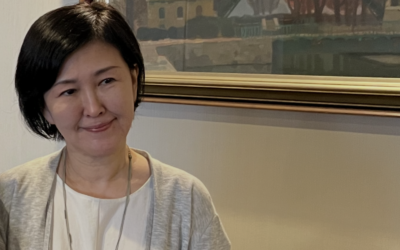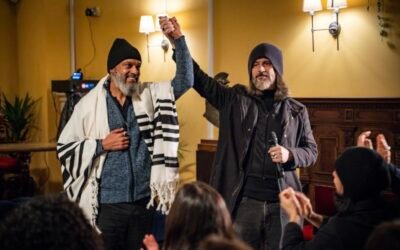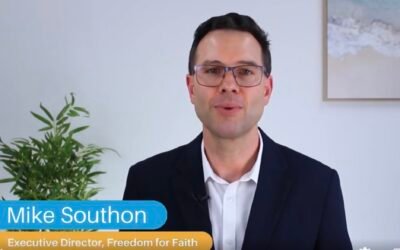The Sapara activist talks about trees, spirits, and greed, and offers his own perspective on religious liberty.
by Livia Filotico

Manari Ushigua is an activist, leader, and wisdom keeper of the Sapara people of the Amazon rainforest of Ecuador. He travels internationally speaking out for the preservation of the Amazon rainforest and the people who call it home. Manari works to protect the Amazon from land grabs and oil companies. Among those he criticized are Petroamazonas, Italy’s Agip, and China Petrochemical & Chemical Corporation (Sinopec).
The Sapara Nation of Ecuador are an Indigenous people native to the Amazon Forest along the border of Ecuador and Peru. Early in the 20th century, there were some 200,000 Sapara, occupying over 30,000 km. Today, there are less than 500 Sapara people left and only four Sapara people, all aged over 70, still speak the Záparo language with some degree of fluency. The Sapara Nation of Ecuador is recognized by UNESCO as an “Intangible Cultural Heritage of Humanity” because their language and culture are in danger of disappearing. Thanks to their ancestral wisdom, they managed to develop a very precise language and culture to describe their environment. Through their oral tradition, they collect knowledge in stories, legends, songs and rituals forming a complete and comprehensive cultural heritage. For the Sapara people, their language is their memory and defines their identity. Their story has been told inter alia in the Financial Times.
The forest contains all of life within itself. By this I mean that the forest is a living entity made up of multiple beings whose point of view matters. My hope is that by reading this piece, you might come away thinking differently about what religion is, why pluralism is our best chance out of the ecological crisis we are living in, and questioning whose rights we can protect.
As an ode to pluralism and a love letter to the very fabric of reality, this piece is firmly against protecting forests as a mere charitable act, choosing instead to stand with the messy, the sensual and—to use anthropologist Eduardo Kohn’s words—the “psychedelic.” This means that when addressing religious freedom in the piece, I do it from the starting point that we’re not “conceding” anything by opening to the pluralism of stories. Rather, we are connecting to life.
Finally, I hope you’ll walk away thinking about politics because the forest, and all of life within it, is in danger and we know who from. Manari told the story to us in his own words.
Let’s talk about the forest. Why is it important?
The word Sapara means “person who lives in the forest,” from which you can begin to understand how important the forest is for us. There is a reason why so many origin stories from around the world start in the forest and that’s because it contains all of life within itself. In our cosmology we think of the world as nukaki, which translates as one while the forest is naku: it is one but inside it are each and every single tree, each and every single being whether human, animal, plant or spirit. And every single one of these beings is telling a story—unique yet interconnected with all other beings and all other stories. That is why now, more than ever, it is important to keep the forest alive, because it has its own way of communicating and connecting with all of life in this world. An example that comes to mind is that of the Balsa tree, growing on the banks of the rivers in the Amazon forest. According to international loggers, mostly Chinese and European, Balsa’s is the perfect wood to generate wind energy because it is both very light and resistant. But for us, Balsa only makes sense when it is rooted in its natural environment because we Sapara value and cherish the natural functioning of the earth. For us Balsa is important because it releases strength and energy so that the lives of all the people that are around it are healthy, oriented and can have clearer dreams. At the same time, it generates a gentle wind which helps regulate floodwaters, when the flow of the rivers increases. This is all to say that there is both a material and a spiritual side to the forest and the two cannot be separated.
The forest is under threat. What and whom from?
Manari: One of humanity’s key problems is that we have convinced ourselves that the forest is just a natural resource to help humans live better. By doing so, we are disrespecting the forest and in the same breath ignoring what we are. We have reached a point where we have become convinced that nature is just a resource put there for our needs and should be taken out, sold, used. The source of the problem of course is money, and many corporations, land grabbers, oil companies and international state companies are convinced that money is the ultimate truth. So, our approach to opposing and defending the forest from these corporations is to turn these ideas on their heads, and to ask people to look at the forest in a very different way: the forest—along with everything that’s under the earth such as oil, gold, minerals, copper—is not a “natural resource.” It is part of life because life on earth needs it to keep going. So, our activism is both about opposing a view of nature as a “resource” and about awakening the human conscience to change course.

Can the concept of human rights—or even of rights beyond the human—help us to overcome the global crisis we are living in?
Humans are great at creating concepts and putting things in boxes, and that of human rights is a particularly lovely category. A rule that says we should stop killing each other is important for our integrity. The problem begins when we extend our categories to other entities and beings without consulting them or listening to them. This is the case with forests, with plants, with animals, and with spirits. For example, Ecuador is the first country in the world to recognize the Rights of Nature in its Constitution, and it sounds good, but too often when we recognize the rights of nature, we are not recognizing nature as an entity, we are recognizing our way of relating to it. If we hit a tree, the tree will manifest its opinion. Why not just begin by listening to that opinion rather than jump straight to assuming we know what’s best for the tree? Many of today’s great environmentalists ask us to see nature like a child, something to be protected and taken care of but really, it is the other way around: nature knows how to defend itself and how to regenerate to remain present in our lives. Until we are able to switch our way of looking at things and listen rather than impose our way of seeing the world onto other entities, we won’t be able to cooperate with forests to face the ecological crisis we are living in. We all want to be part of something important in life but to really do it we have to recognize the interconnectedness of all things: that everything that is alive is in a relationship with all other beings, like a web or a network, and that this web is not just made up of humans but of forests, plants, animals, spirits, and every other living being. Seeing nature as something separate from us means severing our connection to this web. We can no longer solve the problems we are experiencing with the same system we have put in place, whether political, economic, or logical. So, to go back to the concept of human rights and the rights of nature, we Sapara don’t think the answer is in those spaces, within pre-existing categories. The answer is in those spaces where we don’t yet have a structure. We need a vision that is clean and pure and very broad to be able to propose and grasp an idea that is truly going to change us.
What about religious freedom?
Religious freedom is crucial because it allows all cultures around the world to keep telling their stories. As things stand however, we are only hearing stories from the three or four largest religious groups in the world, so I don’t think we can say freedom of religion in the world has been achieved successfully yet. Over the centuries humans have created many gods—which we can do because we are spirits ourselves and our creative power is enormous —and now that we’ve created them, we have to keep telling all their stories—our stories—for them to fulfill their work. What we do when we meet a god is we decide that’s where we fit. We choose our holy texts, our stories, our parables and leave it at that. But this is not at all how it works. Our stories must evolve and intermingle so that we won’t have a single text, or a single story but a multiplicity where competition is going to look far less relevant. The many gods we have created are nukaki: they are one and many, like the forest. They’re our ancestors, our grandparents, and they need us to keep telling their stories because when we do, we connect to the web of life. So, we must find a way to navigate the web, rather than severe ties within it. To give you an example from my personal life, when my spirit was disconnected from my body, the first people I met were my dad and my cousin and they both helped me to go back to my body. This is what the Sapara cosmology values, the natural functioning of life and the connection of all beings. We don’t care about creating new things or saying that something is good or bad. We live like the earth moves and this is why our way of seeing is so open. Once we allow our brains to see and live with the forest, we start seeing things in a different way. If we do this, we will live in a world with hundreds of thousands of stories told in a million different ways and this will give us strength and the ability to change course. Structures are human creations, and we have to respect each and every one of them, recognize them and give them importance but if we limit ourselves to that, our brain will take the same shape that we gave our structure.

Livia Filotico is an activist and curator living between Rome and London. She is the founder and Artistic Director of the Moon Festival, which Time Out London called “lunacy, in the best possible way,” and the founder and Creative Director of Ida: a change-making agency that helps people and communities building deeper relationships.



